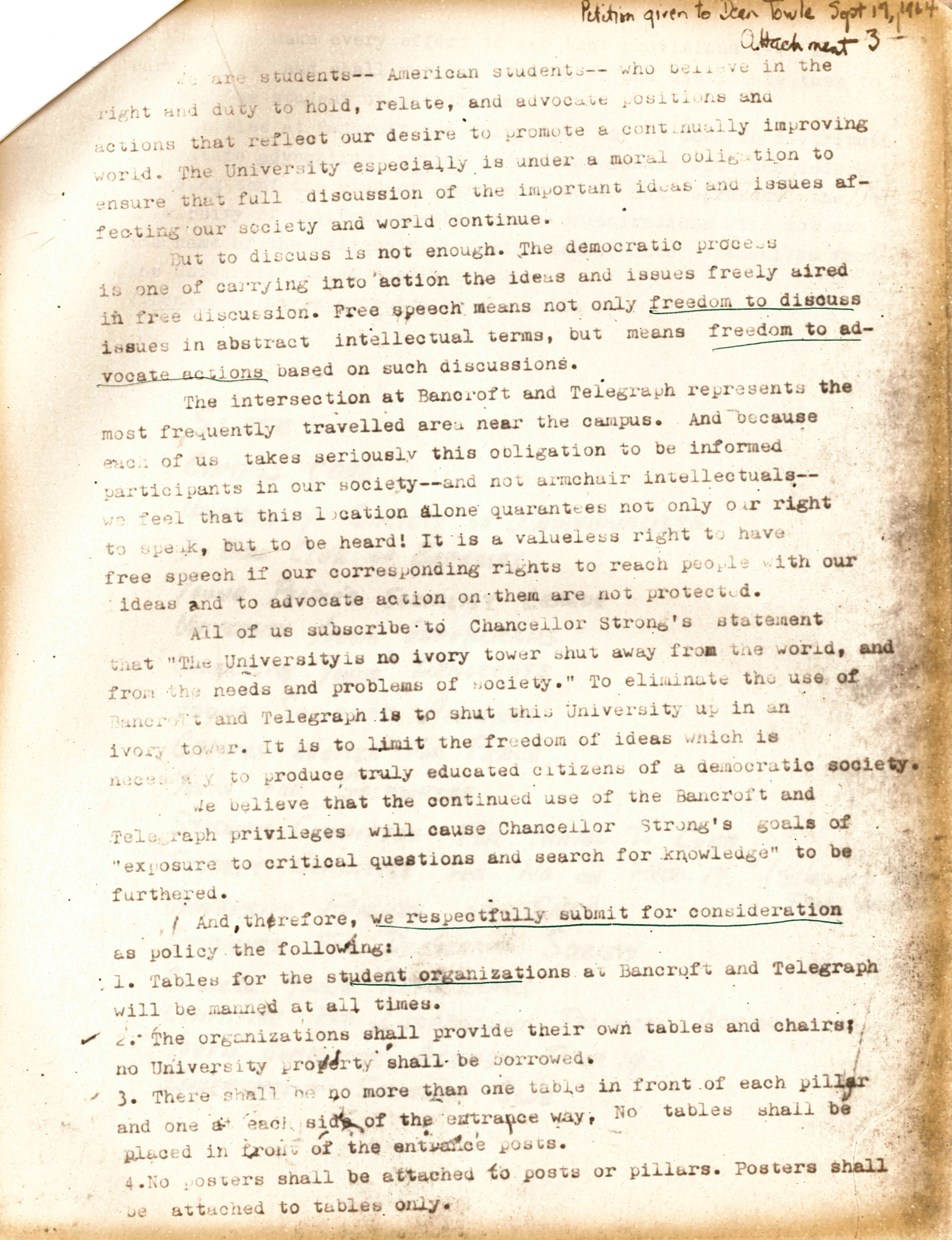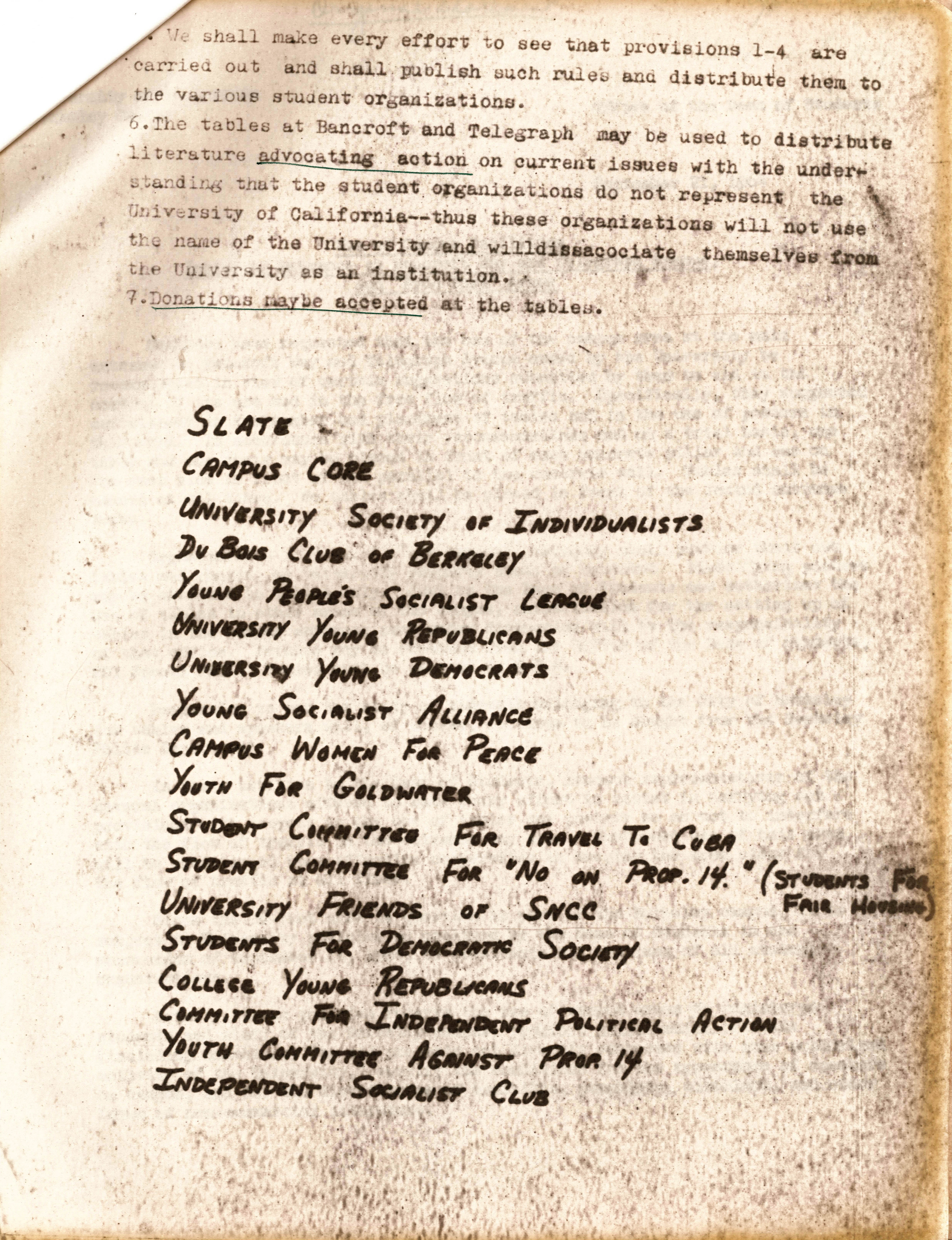What Happened Before the FSM The "United Front" becomes the "Free Speech Movement"
|
||
But the institutional provocations and student organizing began earlier:Chronology of Events September 10 [1964] A letter authored by "a former student" and distributed with the Slate Supplement Report called for an "open, fierce and thoroughgoing rebellion" on the Berkeley campus. Although the letter did not relate specifically to the "free speech issue," it sounded the rallying cry for subsequent events: The University does not deserve a response of loyalty and allegiance from you. There is only one proper response to Berkeley from undergraduates: that you ORGANIZE AND SPLIT THIS CAMPUS WIDE OPEN! . . . "Go to the top. Make your demands to the Regents. If they refuse to give you an audience: start a program of agitation, petitioning, rallies, etc., in which the final resort will be CIVIL DISOBEDIENCE. In the long run, there is the possibility that you will find it necessary to perform civil disobedience at a couple of major University public ceremonies . . ." September 15 The Ad Hoc Committee to End Discrimination -- led by former Berkeley student and Slate founder Michael Myerson and by Tracy Sims, leader of the Palace Hotel demonstrations -- announced plans to picket the Oakland Tribune for the third Friday in a row, and held a noon rally at the Bancroft and Telegraph entrance to the Berkeley campus. September 16 1. Presidents or chairmen and advisers of all student organizations received a letter from Dean of Students Katherine A. Towle, dated Sept. 14, announcing that, effective Sept. 21, tables would no longer be permitted in the 26-foot strip of University property at the Bancroft and Telegraph entrance, and that advocative literature and activities on off-campus political issues also would be prohibited: A facultyChronology points to event in June, 1964 CHRONOLOGY OF THE FREE SPEECH CONTROVERSY ON THE BERKELEY CAMPUS June During Republican National Convention, according to San Francisco Chronicle, 4 Dec. 1964, charges are made by Goldwater supporters that Scranton supporters are illegally recruiting student volunteers on campus. 4 Sept Picketing of Oakland Tribune by Ad Hoc Committee to End Discrimination, which recruits support on Berkeley campus |
||
Precursor to the FSM, September 17, 1964 Petition ● Online Archive of California Petition given to Dean Towle We are students-American students--who believe in the right and duty to hold, relate, and advocate positions and actions that reflect our desire to promote a continually improving world. The University especially is under a moral obligation to insure that full discussions of the important ideas and issues affecting our society and world continue. But to discuss is not enough. The democratic process is one of carrying into action the ideas and issues freely aired in free discussion. Free speech means not only freedom to discuss issues in abstract intellectual terms, but means freedom to advocate actions based on such discussion. The intersection at Bancroft and Telegraph represents the most frequently travelled area near the campus. And because each of us taken seriously this obligation to be informed participants in our society--and not armchair intellectuals--we feel that this location alone guarantees not only our right to speak, but to be heard! It is a valueless right to have free speech if our corresponding rights to reach people with our ideas and to advocate action on them are not protected. All of us subscribe to Chancellor Strong's statement that "The University is no ivory tower shut away from the world, and from the needs and problems of society." To eliminate the use of Bancroft and Telegraph is to shut this University up in an ivory tower. It is to limit the freedom of ideas which is necessary to produce truly educated citizens of a democratic society. We believe that the continued use of the Bancroft and Telegraph privileges will cause Chancellor Strong's goals of "exposure to critical questions and search for knowledge" to be furthered. And, therefore, we respectfully submit for consideration as policy the following: 1. Tables for the student organizations at Bancroft and Telegraph will be named at all times. Slate
|

